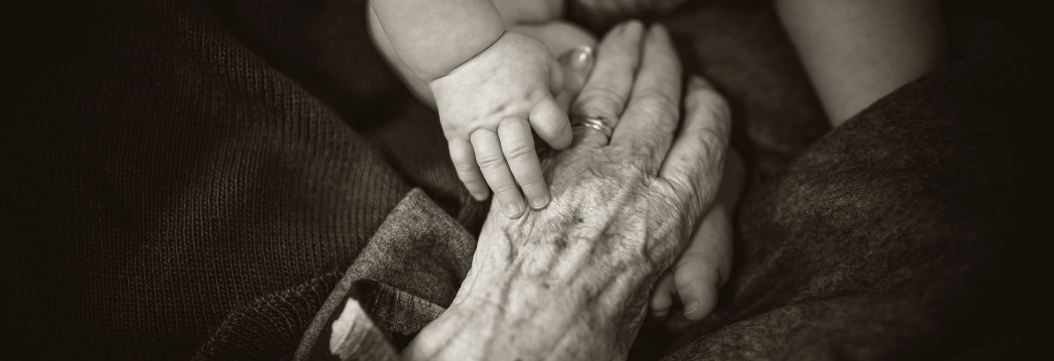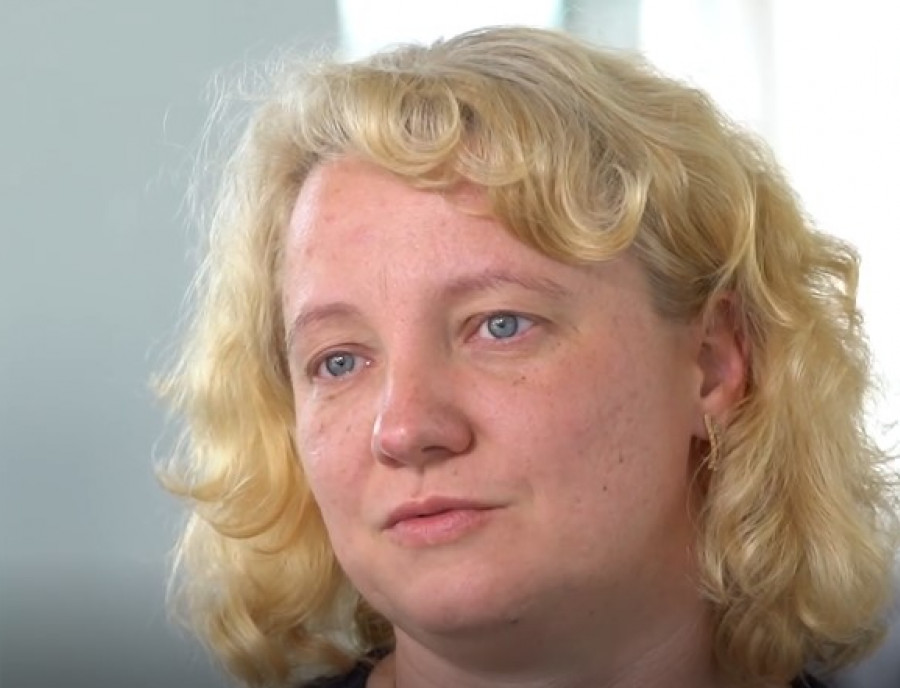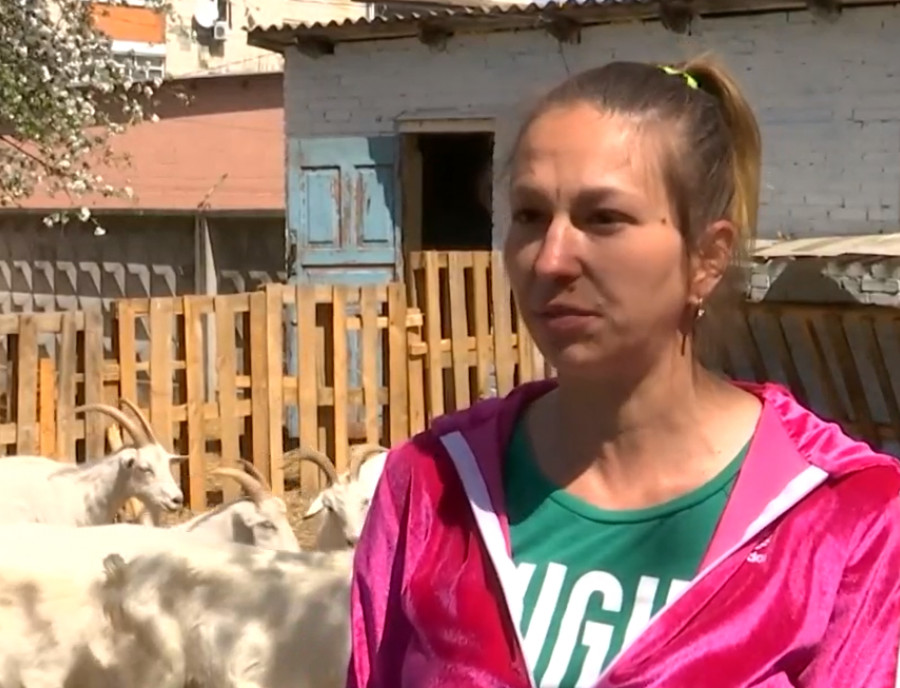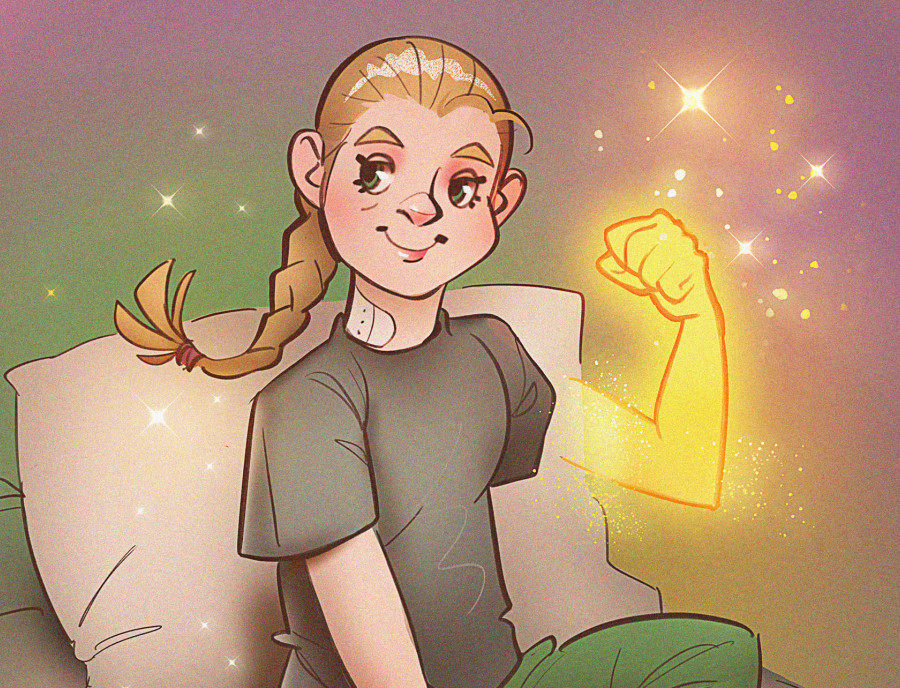Oleksandr lives in Hostomel, near the Antonov airfield. From the first day of the full-scale war, fierce battles unfolded here. A shell hit Oleksandr’s house and now he is homeless, but the most terrible things began when Kadyrov troops entered the town.
This is my entrance door. Up there is the window of my kitchen on the third floor. The children’s room... It does not exist anymore, and the living room does not exist either. The bedroom on the other side is gone too. Here is the entrance through which I went to the basement to hide there. When the helicopters appeared suddenly… About thirty helicopters circled around the Antonov airfield here. They fired their rockets. I thought then, “Splendid! The Antonov airfield has been bombed, no one needs us anymore.”
I got out of the basement and went for a walk around the [military] unit. I took some photos of the results of those strikes. A huge pit where the first rocket landed at 06:45. Then I came back. I needed to go home and charge my phone – luckily, I just had a freshly charged battery in the car. I plugged my phone in the charger and thought that I needed to make a coffee.
I went into the kitchen and looked out of the window: a crowd of people was coming in through the entrance door, about 80 bearded Kadyrov soldiers (Kadyrovites) with weapons. And I was staying there with my two phones. Way to be! “Men, don’t kill…”
They ordered me to undress and searched me. I have a trident tattooed on my chest. Therefore, they started to grill me and make my life a nightmare, “Who did you pass the coordinates to? Are you a spotter/forward observer? – “What spotter could I be? Look at the thick lenses in my glasses. I cannot see well even when wearing my glasses, not to mention without them.” – “Show us the flats where the military live here.” – “Which military do you mean?” “Well, it is a military garrison town, isn’t it?” – “It ceased being a military garrison in 2013 when the military unit was dissolved and everyone left. Only some retired former military men remained here.”
They took me out into the corridor, “Get on your knees and put your hands behind your head.” I got on my knees in my flat and put my hands behind my head. They went out of my flat into the common hallway, pulled the pin out from a grenade and threw it at my feet. I leaped from the corridor into the kitchen, under the kitchen sink, not be hit by fragments.
This is how the Kadyrovites made my life a nightmare. They were from military intelligence. An old Kadyrovite said [that] it was a training grenade. They kicked me out and down to the basement. At first, we were all staying here. A crowd of about two hundred people occupying the entire basement. The mattress remained, and some food too.
We were in captivity for 38 days. From 24 February, when the war began, and until 31 [March], when they left here. When Hostomel was under occupation, people still moved around the town.
Well, with certain limitations because there was a bombing. People in Hostomel could still move around, while we, those living in the former garrison town, could not move freely. We were constantly under guard. From time to time, the elderly, elderly women, begged the Kadyrovites to let them go to their flats to take some things or some food. The Kadyrovites assigned some guards and under escort, a resident could go to his or her flat, took some things and then returned to the basement. There was not a single door in the garrison town that remained locked. They broke all the doors open.
They broke all the electronics appliances and took all the phones. I had three phones and two of them were in a working condition, while the third one was just lying on the shelf. Almost everyone’s phones were taken away. They even took the push-button phones from elderly women. They gave them back and then they took them again never to return. After that, they got me out of the basement three more times. I was treated as a biker. I took everything out of my pockets. I had a radio receiver and I listened to the radio all the time to know the news. They told me not to have anything extra in my pockets. I took everything out. I came out of the darkness, “I am a biker” – “Come with us.”
They took me to the fourth floor. I took everything out of my pockets: some sort of bagels, cookies, a flashlight and a lighter. One could not be without any light here. I took off the upper part of my overalls and asked, “Do I need to take off my pants too?”
He said, “No, leave them on.” He searched me from head to toe. He said, “Get dressed and go back.” I asked, “What is the fuss about?” He said, “There are some working telephones in your part of the basement.” Well, they had some tools, as they were from intelligence. They had “intelligence” chevrons on their backs. They scanned with some tools and identified that we had telephones.
I said, “But you have taken all our phones, even the old ladies’ push-button phones. In addition, our people know that a rocket can hit following a phone signal. I doubt we have any phones. And even if we had any phones, they would have been with flat batteries now, over the time we have been staying here. We do not have any phones. This is probably some of your men, so look among them.” This is the door to my pantry (utility room). When the house was collapsing, I was right there, in this pantry. And the Kadyrovites... That’s exactly the place where they slept.
They hung the carpets and arranged their sleeping place here. He said, “You are now moving to the basement of a neighbouring house.” I asked, “But why?” He said, “Because I decided so.” I said, “Okay. Can I take my things?” – “Yes, take them.” We went downstairs, took a backpack with documents each and went to the basement of the hostel. Here is our toilet. It was a pit, and in the next room, they made it with buckets – this is for women and children. People lived here. Women with children lived here. This is where we cooked and here is where we lived. This is my place, where I lived until 31 March, after I had been moved here from the basement of house no.10. I lived here all that time. There was a table here and we all ate here. This is a chair from my house, the only thing that has been left.
Every day, a group of three guards came. Three guards were at this exit and other three guards at that exit. They changed twice a day. About three or four days before they left, before 31 March, they stopped coming down here.
The fact that we have a well with pumped water in our town helped us a lot. We did not have to melt the snow. On that side, a man was staying all the time and listening if the generator was working or not. If he heard the generator, then we asked the guards if we could go and get some water. If they said “yes”, then we grabbed two water cans and ran to the pump well. There were two hoses sticking out there. The “orcs” [the Russians] used one of them for pouring water and we used the other one. We had to do it really quickly because the shelling could start in 15-20 minutes. It would be followed by some 5-6 minutes of silence and then the shelling would starts again. Our morning began not with a roll call, but with a coughing choir. First, because of the draft here. It was also dusty; cats and dogs stayed with us all the time. The air was damp. In the basement of house no.10, it was much drier and so it was better to stay there than here.
The Colonel came. I don’t know his last name. He did not mention it. He just said, “Call me Colonel.” He said that there would be evacuation to Belarus and that those who wanted could leave then.
The evacuation was not a forced one. It was on a voluntary basis. Most of the evacuees were the elderly. Some people took their elderly parents out. There were some old people who did not walk well. The man in whose house I now live, he was saving his family. He was evacuated too. I listened to the radio all the time and said, “Listen, Volodya, the “Father” [president Lukashenko’s nickname] said that Belarus does not accept Ukrainians. There is a probability that they will bring you to Belarus and then immediately to Russia, and it will be much more difficult to get out of there.” He said, “Anyway, I have to save my family.
My wife has asthma. She suffocates in the basement. Our daughter has panic attacks; she faints, so I need to take my family out anyway.” There were three waves of evacuation. People were evacuated in three rounds. No one from our basement came for the last evacuation wave. We used this calendar was for making roll-up cigarettes. We tore off some calendar pages and made rolled up cigarettes from them. The second of April was the last day I was here.
When quoting a story, a reference to the source – the Museum of Civilian Voices of the Rinat Akhmetov Foundation – is mandatory, as follows:
The Museum of Civilian Voices of the Rinat Akhmetov Foundation https://civilvoicesmuseum.org/






